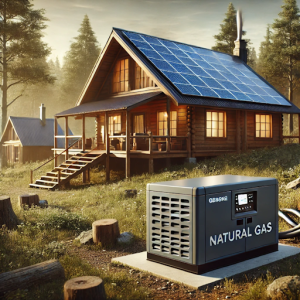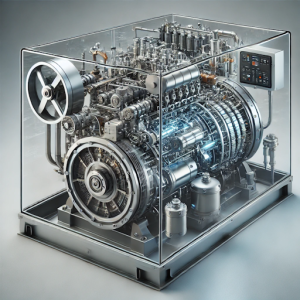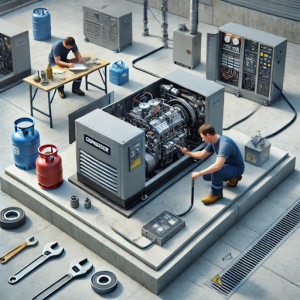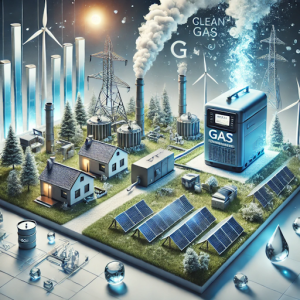Discover How Natural Gas Generators Enhance Sustainable Off-Grid Living
Natural gas generators emerge as a top-tier solution for anyone seeking a dependable source of energy for homes or cabins nestled in remote locations. Gaining a thorough understanding of the various methods of power generation is essential for embarking on a successful off-grid adventure. The unique benefits of natural gas generators, such as their reliability, cost-effectiveness, and environmentally friendly characteristics, make them an appealing choice for those passionate about off-grid living and committed to sustainability and efficiency. By adopting this power solution, you can ensure a seamless transition into a lifestyle that prioritizes both independence and ecological responsibility.
In our technology-driven society, the allure of off-grid living has sparked interest among many individuals. Whether driven by a desire for sustainability, self-sufficiency, or simply a longing for a more autonomous lifestyle, disconnecting from the conventional power grid can be an incredibly rewarding experience. Off-grid power solutions empower you to harness energy from renewable resources or alternative fuels, allowing for a comfortable living experience free from the constraints of traditional electricity sources and fostering a deeper connection with the environment.
By arming yourself with the necessary knowledge and preparation, you can effectively incorporate a natural gas generator into your off-grid lifestyle, thereby ensuring that your essential needs are consistently met with an uninterrupted power supply. This article will delve into the numerous advantages offered by natural gas generators, clarify their operational mechanics, and highlight the critical factors to consider when selecting and installing them for your off-grid setup.
 Essential Insights for Optimizing Your Off-Grid Power Solutions
Essential Insights for Optimizing Your Off-Grid Power Solutions
- By utilizing off-grid power solutions, you can free yourself from reliance on traditional energy sources, making them vital for remote living or during unforeseen power outages.
- Natural gas generators deliver consistent and efficient energy production, producing significantly lower emissions compared to diesel or gasoline alternatives, thus contributing to a greener planet.
- These generators function by combusting natural gas to generate mechanical energy, which is subsequently transformed into electrical energy via a generator system, showcasing their innovative design.
- When selecting a natural gas generator, it is essential to assess factors such as power output, fuel efficiency, and maintenance requirements to guarantee optimal performance tailored to your unique needs.
- Ensuring proper installation and routine maintenance is crucial for the efficient and safe operation of your natural gas generator, enhancing its lifespan and reliability.
Uncover the Unique Benefits of Natural Gas Generators for Reliable Power Generation
One of the standout features of natural gas generators is their remarkable reliability. By opting for a natural gas generator to meet your off-grid energy needs, you can depend on a consistent power supply that aligns with your usage requirements. Unlike solar panels or wind turbines, which can be significantly impacted by weather changes, natural gas generators provide stable energy output that remains unaffected by external conditions. This aspect is particularly critical for those relying on electricity for essential functions like heating, refrigeration, or medical devices. Knowing your generator will deliver power when it’s most needed offers invaluable peace of mind.
In addition to their reliability, natural gas generators also provide substantial cost savings. Although the initial investment might be higher than some alternative off-grid solutions, the long-term savings can be significant. Typically, natural gas is more affordable than gasoline or diesel, resulting in lower operating costs over time. Furthermore, maintenance requirements for natural gas generators are usually less demanding compared to other types, enabling you to conserve both time and resources while benefiting from a steady energy source.
 Understanding the Operational Mechanics of Natural Gas Generators
Understanding the Operational Mechanics of Natural Gas Generators
Natural gas generators operate by converting the chemical energy contained in natural gas into electrical energy through a combustion process. When the generator engages, natural gas is mixed with air and ignited within the engine’s combustion chamber. This ignition produces high-pressure gases that drive the engine’s pistons, ultimately rotating the generator’s rotor and generating electricity. This operational approach is particularly noteworthy for its efficiency, as it is significantly cleaner than other fossil fuel options available on the market.
A crucial component of a natural gas generator is its fuel system, which generally includes a regulator that controls the gas flow to guarantee optimal performance. Modern natural gas generators come equipped with advanced features, such as automatic start/stop functions and remote monitoring capabilities. These innovations greatly enhance user convenience by allowing you to manage your power supply more effectively, simplifying your transition to an off-grid lifestyle.
Essential Considerations for Selecting the Ideal Natural Gas Generator
| Consideration | Description |
|---|---|
| Power Output | Evaluate the generator’s required power output based on the appliances and equipment you plan to operate to ensure adequate energy supply. |
| Fuel Type | Opt for natural gas as your fuel choice due to its clean-burning and cost-effective attributes, enhancing your off-grid experience. |
| Size and Portability | Choose a generator size and portability that align with your available space and mobility needs, ensuring ease of use and convenience. |
| Noise Level | Assess the generator’s noise output to confirm it meets acceptable standards for your living environment, maintaining a peaceful atmosphere. |
| Start-up Mechanism | Determine whether to choose manual or automatic start-up options based on your convenience and frequency of usage, enhancing user experience. |
When selecting a natural gas generator for your off-grid setup, there are several key factors that must be carefully evaluated. First and foremost, assess your power requirements. Calculate the total wattage needed to support your essential appliances and devices, ensuring that your chosen generator can effectively manage the load. It is advisable to choose a generator with a slightly higher capacity than your calculated needs to accommodate any sudden spikes in power demand.
Another important aspect to consider is the generator’s portability and installation requirements. If you plan to move your generator frequently or use it in various locations, opt for a model that is lightweight and easily transportable. Additionally, think about whether you prefer a stationary installation or a portable unit that can be set up conveniently according to your requirements. Lastly, consider the generator’s noise level; quieter models can significantly enhance your off-grid experience by minimizing disturbances and preserving the serenity of your natural surroundings.
 Adopting Best Practices for Optimal Installation and Maintenance of Natural Gas Generators
Adopting Best Practices for Optimal Installation and Maintenance of Natural Gas Generators
The installation process of a natural gas generator necessitates meticulous planning and execution to ensure both safety and efficiency. Begin by selecting an appropriate location for your generator, ensuring compliance with local regulations and safety guidelines. Ideally, this site should be well-ventilated and located a safe distance from flammable materials to mitigate risk.
You may also need to establish a concrete pad or platform to stabilize and protect the generator from potential moisture damage. Once the ideal location is determined, connect the generator to your natural gas supply line. If you lack expertise in gas line installations, consider seeking professional assistance to guarantee adherence to all safety standards, thus ensuring optimal functionality.
After successfully establishing the fuel connection, set up the necessary electrical connections to integrate the generator with your home’s electrical system. Regular maintenance is vital for ensuring your generator operates efficiently. This includes routine checks of oil levels, air filter replacements, and spark plug inspections to maintain peak performance and extend the life of your generator.
Comparing Costs: Natural Gas Generators Versus Alternative Off-Grid Power Solutions
When assessing the costs associated with off-grid energy solutions, it is crucial to conduct a comprehensive comparison between natural gas generators and alternative options such as solar panels and diesel generators. While solar energy systems have garnered attention for their renewable nature, they often require a significant initial investment in panels, batteries, and inverters. Additionally, solar systems may struggle to provide sufficient power during cloudy days or at night without adequate battery storage, making them less reliable in certain conditions.
On the other hand, diesel generators are recognized for their reliability, yet they often come with higher fuel costs and more frequent maintenance requirements than natural gas generators. Considering that diesel fuel prices can fluctuate dramatically, natural gas typically provides a more stable and often lower-cost option across many regions. A long-term expense analysis reveals that natural gas generators generally offer a more economical solution for those pursuing off-grid living, allowing for better budgeting and financial planning.
 Analyzing the Environmental Effects of Natural Gas Generators in Off-Grid Living
Analyzing the Environmental Effects of Natural Gas Generators in Off-Grid Living
As you explore your off-grid energy options, it is essential to evaluate their environmental impact. Natural gas is often promoted as a cleaner alternative to other fossil fuels like coal or oil, primarily due to its lower carbon emissions during combustion. By choosing a natural gas generator, you can significantly reduce your carbon footprint while enjoying a reliable power source for your off-grid lifestyle.
However, it is vital to recognize that natural gas remains a fossil fuel, and its extraction can have adverse environmental consequences. Methane leaks during the extraction and transportation processes present significant challenges in terms of greenhouse gas emissions. To mitigate these issues, prioritize sourcing natural gas from reputable suppliers committed to sustainable practices and environmental responsibility.
Furthermore, integrating renewable energy sources alongside your natural gas generator can further demonstrate your commitment to environmental sustainability and responsible energy consumption, enhancing your overall off-grid experience.
Inspiring Real-Life Success Stories of Natural Gas Generators in Off-Grid Scenarios
Examining real-world examples can offer valuable insights into how natural gas generators have been effectively utilized in off-grid living situations. For instance, numerous rural homeowners have successfully adopted natural gas generators as their primary energy source after facing frequent outages from conventional utility services. The transition to these generators has empowered them to achieve energy independence while ensuring consistent electricity for heating, cooling, and essential appliances, significantly improving their quality of life.
Another compelling case involves remote cabins that rely on natural gas generators for seasonal use. Given their isolated locations, these cabins often lack access to conventional power sources. Natural gas generators enable cabin owners to enjoy modern conveniences such as refrigeration and lighting without sacrificing their connection to the natural environment. These success stories illustrate how natural gas generators can effectively support off-grid living, providing both comfort and reliability. As you embark on your off-grid journey, consider the extensive benefits that natural gas generators can provide. From their reliability and cost-effectiveness to their relatively low environmental impact, these generators can play a pivotal role in achieving energy independence.
By carefully selecting the right model for your needs and adhering to proper installation and maintenance procedures, you can smoothly transition into an off-grid lifestyle powered by natural gas, enriching your living experience.
Addressing Frequently Asked Questions About Natural Gas Generators
What characterizes a natural gas generator designed for off-grid applications?
A natural gas generator for off-grid living is a power generation system that utilizes natural gas as a fuel source to produce electricity in remote locations where access to the main power grid is limited or entirely absent, ensuring functionality and reliability.
How does a natural gas generator operate effectively for off-grid use?
A natural gas generator intended for off-grid applications functions by combusting natural gas within an internal combustion engine. This combustion process generates mechanical energy, later converted into electrical energy via a generator. The electricity produced can power various appliances, equipment, and lighting in off-grid settings, making it a versatile solution.
What are the primary advantages of utilizing a natural gas generator in off-grid living scenarios?
Key benefits of employing a natural gas generator for off-grid living include:
– Lower fuel costs compared to diesel or gasoline generators, maximizing your budget
– Cleaner combustion, resulting in reduced emissions and a smaller environmental footprint
– Continuous fuel supply sourced from natural gas pipelines, ensuring steady operation
– Decreased maintenance requirements relative to other fuel types, making it easier to manage
What factors should be taken into account when utilizing a natural gas generator for off-grid living?
Important considerations when using a natural gas generator in off-grid contexts include:
– Availability of natural gas supply in your area to ensure reliability
– Initial installation and equipment costs to factor into your budget
– Regular maintenance and servicing needs to keep the generator running smoothly
– Environmental implications and adherence to emissions regulations to promote sustainability
Is the use of a natural gas generator off-grid practical for residential and commercial purposes?
Natural gas generators designed for off-grid use are suitable for both residential and commercial applications. They are commonly utilized in remote homes, cabins, farms, and small businesses lacking connectivity to the main power grid, providing a reliable energy source.
The post Natural Gas Generators for Off-Grid Power Solutions appeared first on Survival Bite.
The Article Natural Gas Generators: Your Off-Grid Power Solution Was Found On https://limitsofstrategy.com


It’s intriguing to see how natural gas generators are becoming synonymous with sustainable off-grid living, as you so aptly note. Your emphasis on reliability and eco-friendliness resonates with me, especially in today’s world where the quest for independence from traditional utility grids is gaining momentum. I recently encountered a community that has fully embraced this lifestyle, and it’s fascinating to observe how natural gas generators play a pivotal role in their day-to-day operations.
It’s definitely a fascinating shift to see how natural gas generators are becoming emblematic of sustainable off-grid living. The way you describe the community embracing this lifestyle really paints a picture of a growing movement towards self-sufficiency. The reliability of these generators can’t be understated, especially when you consider how unpredictable traditional utility grids can be, especially in the face of climate challenges and increasing demand.
It’s great to hear your thoughts, and it’s fascinating how communities are carving out this off-grid lifestyle. Natural gas generators can really bridge that gap between reliable energy and a lower environmental impact, which has become so important as more people seek autonomy from traditional utility grids.
I find the conversation around natural gas generators and off-grid living to be incredibly timely and relevant, especially in an era where energy independence and environmental sustainability are becoming increasingly paramount. Your exploration of the advantages of natural gas generators resonates with my own journey toward more sustainable living.
I completely relate to what you’re saying about the conversation around natural gas generators and off-grid living being so timely and relevant. It feels like we’re at a turning point where the balance between energy independence and environmental concerns is more critical than ever.
It’s great to hear that you find the conversation around natural gas generators and off-grid living so relevant. It’s fascinating how energy independence has become a key focus for many people, especially as we think about striking a balance between our energy needs and environmental concerns.
It’s fascinating to see how natural gas generators have become a pivotal part of the off-grid living conversation. I appreciate how you’ve highlighted their reliability and eco-friendly aspects, as many of us are seeking alternatives to traditional energy sources.
I appreciate how you’ve shed light on the role of natural gas generators in sustainable off-grid living. Your exploration of their reliability and cost-effectiveness resonates with my own journey toward living in a more environmentally responsible way. However, while natural gas is often viewed as a cleaner fossil fuel option compared to coal or oil, I think it’s also important to consider its overall impact on our transition to a truly sustainable future.
You’ve hit the nail on the head with your thoughts! Natural gas can certainly be seen as the ‘cleaner cousin’ in the fossil fuel family, but it’s like inviting him to your eco-friendly party and still expecting him to show up in a gas-guzzling monster truck. While it does burn cleaner, the methane leaks along the supply chain can be a bit of a party pooper for our climate goals.
Your exploration of natural gas generators as a means to facilitate off-grid living raises some crucial considerations about balancing our energy needs with environmental impact. While natural gas is often touted as a cleaner alternative to coal or oil, it’s important to examine the complete picture. The extraction and transportation processes of natural gas can be detrimental to local ecosystems and communities due to potential methane leaks and water pollution.
You make a really important point about the complexities of natural gas as an energy source. It’s easy to get caught up in the idea that switching from coal or oil to natural gas is a clear win for the environment. However, when you look deeper into the extraction and transportation processes, the potential consequences are concerning. Methane leaks are particularly troubling because, as you likely know, methane is a potent greenhouse gas with a much higher warming potential than carbon dioxide in the short term.
I recently came across an article that delves into how marble polishing can really protect your investment, drawing some interesting parallels to the complexities of balancing our energy needs with environmental concerns.
‘Marble Polishing Protecting Your Investment’
https://deepernyc.com/marble-polishing-protecting-your-investment/.
You’ve touched on some critical insights about natural gas and the environmental complexities it brings along. The potential rebound effect of switching from more carbon-intensive fuels like coal and oil to natural gas can be misleading. While the immediate emissions profile looks better, the whole picture, especially when you factor in methane leaks, paints a more complicated scenario. It’s true that methane is a formidable greenhouse gas, with a warming potential that makes us reconsider how “clean” natural gas really is.
I appreciate your exploration of how natural gas generators can enhance off-grid living. There’s something quite compelling about the independence that comes with self-sufficient energy sources, especially when nestled in nature’s embrace. Having spent some time living in a remote cabin, I can attest to the importance of reliable energy; it truly shifts the experience from merely surviving to truly enjoying the simplicity of life off the grid.
Your insights into natural gas generators really resonate with me, especially their role in enhancing sustainable off-grid living. I’ve been contemplating transitioning to a more self-sufficient lifestyle, and the reliability and eco-friendliness you mentioned are crucial factors.
It’s great to hear that the insights into natural gas generators struck a chord with you. Transitioning to a self-sufficient lifestyle is no small feat, and recognizing the importance of reliability and eco-friendliness is a crucial part of that journey.